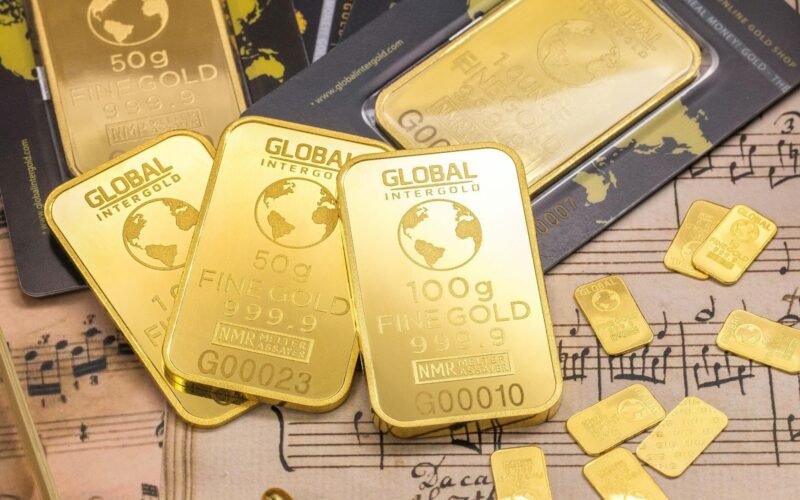A self-directed individual retirement account allows investors to select alternative investments aside from the conventional or the paper assets. That doesn’t mean you can’t invest in these with self-directed accounts.
Still, the primary reason most people choose SDIRAs is for the alternate options, including physical commodities, particularly precious metals like gold. Visit Investing in Gold for more details. It’s a compelling choice but not a suitable investment for every investor.
When establishing a portfolio strategy that strives toward retirement goals, the suggestion is that gold boasts a safe haven regardless of an individual’s social or economic standing when times become turbulent.
The precious metal sees volatility and risk as with any investment, only in a different context. As a rule, the value remains relatively constant. When it grows, it can be substantial.
The suggestion is that metal has seen a “500 percent increase since 2002.” Those figures are enticing to clients looking for SDIRA options. Will it work for you? Let’s look at some of the pros and cons.
What Are The Pros And Cons Of Gold Investing
For those who want to step outside the conventional asset classes into the alternative sector for retirement planning, the options require that you invest in a self-directed individual retirement account.
With this sort of IRA, you still have the choice of the conventional investments but can take a step into alternate options like physical commodities, including precious metals. Many investors striving for a diverse, balanced and stable portfolio opts for gold, but the metal is not necessarily the right choice for all investors.
It’s crucial to weigh the advantages and downsides as they pertain to your financial circumstances. You could already own gold but aren’t aware of how that will translate to retirement planning. Let’s review the benefits.
- Gold remains constant when times are turbulent
When there is volatility on the economic and political fronts, the gold market tends to remain stable and often even rises in these difficult times. The consensus in the investment community is that precious metals, more specifically gold, act almost reminiscent of insurance, offering clients a certain peace of mind.
Of course, if you were one who had all your wealth tied into assets that correlate with how the markets performed, the mindset in a crisis would be one of panic and fear. These emotions tend to dictate impulsive reactions that many eventually regret down the road, like when retirement rolls around.
- Hedge against the turmoil that accompanies inflation
In a similar vein, it is suggested that gold acts as a hedge against inflation. Despite the potential for currency to devalue, gold remains constant.
- The asset is tangible
The precious metal is a physical commodity, one that you can actually hold when purchasing bullions, whether the bars or coins, whenever you wish to access the products. This accounts for some of the benefits associated with the asset, especially when there is turbulence.
With paper assets, including stocks, whether in gold or other securities, a physical commodity has the capacity for you to pick it up any time there is volatility.
In this way, you can visibly take account of your holdings to recognize that you have protection helping to stabilize your wealth, making it an excellent long-term investment. That means the option can withstand well for retirement goals.
- Gains are not lost on the precious metal
Many will argue that the physical asset misses as far as offering a portfolio showing significant gains in interest or dividends where other assets can provide rapid growth, albeit with much more risk and volatility.
Still, these individuals need to look a little closer at the substantial gains the metals have seen when their value rises.
When it grows in value, the investor benefits substantially. Within the last decade alone, the prices for the metal have been elevated based on “the security of supply and demand.”
The price increases have not only been something seen in the current landscape but as far back as a century, there have been steady increases along with significant growth episodes.
As the world continues to see uncertain times and current turmoil, a rise could be on the horizon, leaving an even greater footprint towards the future.
On that note, let’s see what a few of the downsides of this precious metal might include.
- As mentioned, gold won’t pay interest or dividends to the investor
The metal is one that has shown to be beneficial to have in a portfolio to balance and protect the holdings in times of crisis since there’s no correlation with the markets in the same way as paper assets. With paper’s correlation to the markets, fluctuations can mean a significant loss.
The downside with gold is that it needs to increase in value in order for you to achieve a gain or be able to sell and make a decent profit. You might not want to be mindful of the market in an effort to sell your precious metals when you’re attempting to enjoy a fruitful retirement future.
- The metal could be less of a hedge against inflation than initially thought
The suggestion has always been that gold is an ideal hedge against inflation. Still, those paying attention to the market correct that ideology. These pros indicate the metal is a hedge against crises but has been known to fluctuate in times of inflation, having periods where it has dropped in value when inflation has been elevated. Go here for details on gold vs. inflation.
Final Thought
Gold is a viable retirement investment option but is not necessarily a “stress-free” choice. Finding an investment that gives you zero stress would probably be a challenge. The idea of decreasing your risk and volatility, thereby helping to reduce your anxiety, is to diversify your holdings.
Gold can be an element in that mix but keep the assets balanced so the returns you see will lead you to meeting goals and a successful retirement future.

